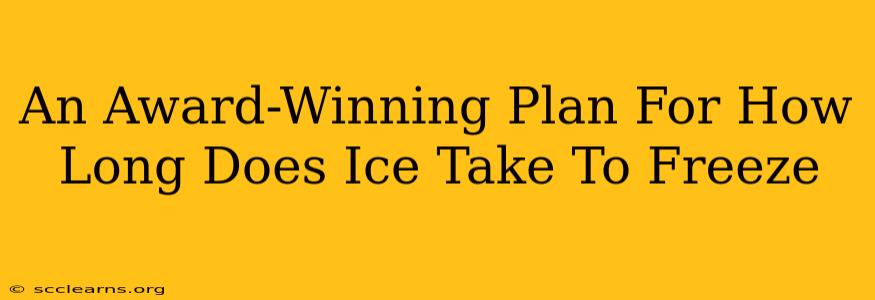Freezing time depends on several factors. This isn't a simple "X minutes" answer; it's a fascinating exploration of physics and practical application. This guide offers an award-winning plan to understand and control your freezing times, whether you're a culinary artist or a curious scientist.
Factors Affecting Freezing Time: The Unsung Heroes
Several key players influence how long it takes for water to transform into ice. Understanding these is crucial for precise freezing control.
1. Starting Temperature of the Water:
- Room Temperature vs. Cold Water: Room-temperature water will naturally take longer to freeze than water already chilled in a refrigerator. The greater the initial temperature difference, the longer the freezing process.
- Pre-Chilling Strategy: Strategically pre-chilling your water significantly reduces overall freezing time.
2. Volume of Water:
- More Water, More Time: A larger volume of water requires more time to lose its thermal energy and reach the freezing point. Think about a small ice cube versus a large ice block.
- Surface Area: The surface area exposed to the freezing environment also matters. A shallow, wide container will freeze faster than a tall, narrow one due to increased surface area.
3. Type of Freezer:
- Freezer Temperature: The colder the freezer, the faster the freezing. Maintaining optimal freezer temperatures is essential for consistent results. Check your freezer's manual for recommended settings.
- Freezer Type: Different freezer types (chest, upright, frost-free) have varying freezing capacities. Frost-free freezers, while convenient, can sometimes be less efficient at rapid freezing.
4. Container Material and Shape:
- Insulating Properties: Materials like plastic and glass offer different levels of insulation. Metal containers generally facilitate faster freezing due to their superior heat conductivity.
- Shape and Surface Area (revisited): As mentioned above, a wide, shallow container exposes more surface area, accelerating the freezing process.
5. Ambient Conditions:
- Air Circulation: Adequate air circulation around the container helps dissipate heat more efficiently. Avoid overcrowding your freezer.
- External Temperature Fluctuations: Frequent opening and closing of the freezer door can introduce warm air, potentially slowing down freezing.
Award-Winning Techniques for Faster Freezing
Here's how to optimize your freezing process for consistently quicker results:
1. Pre-Chill Your Water:
Start with cold water from the refrigerator. This significantly reduces the initial temperature difference, accelerating the overall freezing time.
2. Choose the Right Container:
Opt for a shallow, wide container made of metal. This maximizes surface area and facilitates efficient heat transfer.
3. Maximize Air Circulation:
Ensure proper air circulation in your freezer by avoiding overcrowding. Leave some space around the container to allow for efficient heat dissipation.
4. Monitor Your Freezer Temperature:
Maintain your freezer at its optimal temperature. Consult your freezer’s manual to determine the best setting for consistent, rapid freezing.
5. Consider Using Ice Cube Trays:
For smaller quantities of ice, ice cube trays are designed for optimal freezing, providing many small batches of ice fast.
Conclusion: Mastering the Art of Freezing
By understanding these factors and applying these techniques, you can dramatically reduce ice freezing time. This knowledge isn't just about speed; it's about control and efficiency, whether you're freezing water for a refreshing drink or a crucial step in a culinary masterpiece. Remember, consistent results depend on managing these key variables. Now go forth and conquer the art of freezing!

